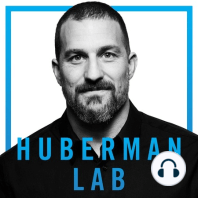4 min listen
The Science of Hearing, Balance & Accelerated Learning
FromHuberman Lab
ratings:
Length:
121 minutes
Released:
Jul 5, 2021
Format:
Podcast episode
Description
This episode I describe how our ears and nervous system decode sound waves and gravity to allow us to hear and make sense of sounds. I also describe protocols for rapid learning of sound and other types of information. I discuss sound localization, doppler effects (sound motion), pitch perception and how we isolate sounds in noisy environments. I also review the scientific findings on binaural beats and white noise and how they can improve learning. Other topics and protocols include tinnitus, sea sickness, ear movement, ear growth and the science-supported ways we can all accelerate learning using "gap effects". Thank you to our sponsors: ROKA - https://www.roka.com - code: huberman InsideTracker - https://www.insidetracker.com/huberman Headspace - https://www.headspace.com/specialoffer Our Patreon page: https://www.patreon.com/andrewhuberman Supplements from Thorne: http://www.thorne.com/u/huberman Social: Instagram - https://www.instagram.com/hubermanlab Twitter - https://twitter.com/hubermanlab Facebook - https://www.facebook.com/hubermanlab Website - https://hubermanlab.com Neural Network - https://hubermanlab.com/neural-network Links: Review on spacing effects and learning: https://bit.ly/3qM6bto Micro-rest and accelerated learning: https://bit.ly/3hitXKM Ear movement: https://bit.ly/2TrS9Bf Ears making sounds, hormones: https://bit.ly/3yneKgV Binaural beats: review and references: https://bit.ly/36fggFO Timestamps: 00:00:00 Overview of Topics 00:02:20 Protocol: New Data for Rapid Learning 00:09:10 Introduction: Hearing & Balance 00:13:53 How We Perceive Sounds 00:21:56 Your Hearing Brain (Areas) 00:23:48 Localizing Sounds 00:28:00 Ear Movement: What It Means 00:33:00 Your Ears (Likely) Make Sounds: Role of Hormones, Sexual Orientation 00:35:30 Binaural Beats: Do They Work? 00:43:54 White Noise Can Enhance Learning & Dopamine 00:51:00 Headphones 00:55:51 White Noise During Development: Possibly Harmful 01:03:25 Remembering Information, The Cocktail Party Effect 01:12:55 How to Learn Information You Hear 01:18:10 Doppler 01:22:43 Tinnitus: What Has Been Found To Help? 01:30:40 Aging: How Big Are Your Ears? 01:35:00 Balance: Semi-Circular Canals 01:40:35 A Vestibular Experiment 01:43:15 Improve Your Sense of Balance 01:48:55 Accelerating Balance 01:51:55 Self-Generated Forward Motion 01:56:25 Dizzy versus Light-Headed 01:58:38 Motion Sickness Solution 02:01:23 Synthesis
Released:
Jul 5, 2021
Format:
Podcast episode
Titles in the series (100)
Welcome to the Huberman Lab Podcast: Welcome to the Huberman Lab Podcast, a new podcast from Dr. Andrew Huberman. Podcast can also be found on YouTube here: My plan in creating this podcast is to discuss Neuroscience: how our brain and its connections with the organs of our body... by Huberman Lab
